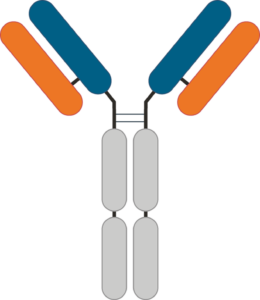
Developing the next generation of antibody therapies targeting both novel and validated targets in inflammatory and auto immune diseases
One of Shattuck’s core competencies is our deep understanding of the tumor necrosis factor (TNF) family of receptors and state-of-the-art protein engineering capabilities. This foundation has positioned Shattuck to rapidly develop differentiated agents targeting clinically validated pathways, including the TL1A/Death Receptor 3 (DR3) axis.
Shattuck pioneers protein engineering to improve the lives of patients with debilitating disease.
The recent clinical successes of anti-TL1A therapies have proven that the TL1A/DR3 pathway is a key driver of inflammation in Crohn’s Disease and Ulcerative Colitis. To date, all clinical stage efforts have focused on blocking the ligand, TL1A. Whereas TL1A is expressed only transiently at sites of inflammation, the DR3 receptor is expressed constitutively on circulating lymphocytes. The expression patterns of the DR3 receptor and the PD-1 checkpoint pathway receptor are quite similar, as are the expression patterns of their respective ligands, TL1A and PD-Ll. As such, we believe that blockade of DR3 may provide improved clinical response in comparison to TL1A blockade. Blocking this native pairing has demonstrated significant clinical benefits for patients with first-generation TL1A-blocking monoclonal antibodies. Shattuck intends to build on this success with a differentiated approach.
Shattuck’s lead DR3 blocking antibody, SL-325, demonstrates superior inhibition and efficacy in preclinical assays over therapies targeting TL1A. SL-325 harnesses the power of high affinity, epitope specificity and critical Fc-silencing to block TL1A from engaging DR3 expressed on multiple immune cells that drive inflammation.


Key Attributes of SL-325
From our scientific expertise in protein engineering, we have advanced SL-325, a first-in-class DR3 antagonist. Our preclinical studies demonstrate high affinity binding, superior efficacy over TL1A antibodies, and offer a data-driven rationalization for targeting the TNF receptor, DR3, versus its ligand, TL1A.
SL-325 Compound Key Features
- Efficiently blocks soluble trimeric and membrane bound TL1A binding to DR3
- pM binding affinity to DR3
- Highly selective and does not cross-bind to other members of the TNF receptor family and the decoy receptor 3 (DcR3)
- Fully Fc-silenced to prevent unwanted immune activation
Citations:
- Bamias G, et al. Gut 2024.
- Schreiber T, et al. Immunol Res 2013
